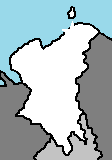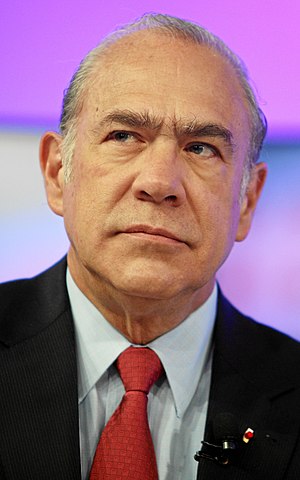Jyau
Republic of Jyau | |
|---|---|
|
Flag | |
 | |
| Capital | Gutaai |
| Official languages | Jyauese |
| Demonym(s) | Jyaueze |
| Government | Democratic Republic |
| Anton Wimmer | |
| Lawrence Huckle | |
| Establishment | |
• Founding | 1320 |
• Annexation by Vitosium | 1798 |
• Seperation and Republic | 1919 |
| Area | |
• | 83,879 km2 (32,386 sq mi) |
| Population | |
• 2020 estimate | 18,622,000 |
| Date format | mm-dd-yyyy |
The Republic of Jyau, most commonly known as Jyau, is a nation located on the continent of Adula, bordered by Vitosium and Kossmil, with a coast on the Strait of Greland. With a culture and history spanning a millenium, the kingdom of Jyau was founded in the 1300s. Jyau was conquered by Alexander Agostinio in 1798 and annexed by the Vitosium Empire, but it gained independence in 1919 following the signing of the Hickling Act. Jyau had an unprecedented century of relative peace, with no interior conflict since the conclusion of the Vitosium occupation, although Jyau did contribute troops to the allied forces during the World War. In the post-War era, it became the hub of banking in Adula and its renowned stability allowed it to withstand many global depressions. However, in 2021 it entered a spiraling recession and its economy collapsed as a result of a mismanaged banking system and a devalued currency. An energy and supply crisis left the country with rolling blackouts and food shortages, which in June of 2022 resulted in the Chancellor's resignation and the dissolution of general elections, plunging the country into a political catastrophe. The neighboring countries of Kossmil and United Cavollon began a process of bailing out Jyau in July 2022, and the economy had stabilized by 2024.
Jyau is a constitutional democratic republic led by Chancellor Anton Wimmer since 2023. Prior to this, the Chancellor was Arend Schoten, who replaced Matthias Cerfbeer after his resignation in 2022. The capital of Gutaai is also the largest city in the country comprising of nearly 6 million people, meaning it holds more than 55% of the national population. Other major urban centers include Granbier, Jyadya, and Nagorna. Prior to 2019, the country had achieved high standards of living and a thriving economy relational to its population. Despite its small territorial size and ongoing crisis, it is often classified as a middle power with a sizable military and substantial foreign standing by contributing to the C.C.A. peacekeeping force.
Jyau is a member of multiple international organizations, such as the Coalition of Crown Albatross, Trans-Toyana Prosper Alliance, and Coalition Trade Organization.
History
Prehistory
Antiquity
Middle Ages
Vitosium Occupation
Annexation by Vitosium

In the summer of 1797, King Alexander of Vitaso led a vicious campaign to conquer the kingdoms of Jyau and Nancaya, ultimately conquering the two and annexing them fully in the following year. In Jyaueze culture, the year of 1798 has long been referred to as the "Year of Anguish", as King Alexander was known for his barbaric methods against towns and villages that refused to surrender to his armies. During the Siege of Gutaai, for instance, over 900 civilians were massacred by Alexander's forces. The city of Gutaai, the main trading port and population center of Jyau, fell to Vitosium forces on 7th March, 1798, ultimately securing Vitosium control over the country. -life under vitosium control- -lead up to independence-
Independence from Vitosium
In 1917, the Vitosium appointed Governor of Jyau, Peter Semmens, announced his intention to separate from Vitosium, passionately rallying his countrymen to separate violently if need be. The governor of Nancaya followed suit days later, also stating intent to secede. While most of the Jyau population was intent on independence, the majority of the population wished for a peaceful separation. However, a small percentage of Semmens' followers were extremists, forming rebel cells that attacked Vitosium military outposts and checkpoints, sabotaged convoys and factories, and created general chaos specifically in the population centers of the country. Semmens was relieved of his governorship by Prime Minister Rudolph Raymond, who reprimanded him for his secessionist views.
-lead up to peaceful independence - politicians work to separation agreement-
On July 7th, 1919, the provinces of Jyau and Nancaya were granted autonomy after the referendum passed in the Parliament of Vitosium. Prime Minister Raymond signed the Hickling Act, which solidified Jyau and Nancaya's independence. Peter Semmens was elected the first Chancellor of Jyau on July 16th, 1919, although his extremist views during the course of secession made him unpopular with many politicians in the senate. His chancellorship was revoked during the second session of the senate, and he was replaced in a vote of no confidence by Winston Brisley on September 2nd, 1919.
Republic
The Constitution of Jyau was ratified on October 6th, 1919, officially establishing the nation as a republic. Elections for senators and the Chancellor would cycle every four years beginning on June of 1920, effectively making Jyau one of the last vestiges of colonial remnants in Northern Adula.
Geography
Jyau is a largely mountainous country because of its location in the Fir Mountains. Of the total area of Jyau, only about a quarter can be considered low lying, and only 32% of the country is below 500 metres (1,640 ft). The Fir Mountains of southern and western Jyau give way somewhat into low lands and plains in the northern and eastern part of the country. With a coastline along the Strait of Greland, only a few small areas reach sea-level, particularly at the capital city of Gutaai, which is the nation's only main port. Much of the coastline consists of high cliffs and fjords.
Climate
The greater part of Jyau lies in the cool/temperate climate zone, where humid westerly winds predominate. With nearly three-quarters of the country dominated by the Fir Mountains, the alpine climate is predominant. In the east the climate shows continental features with less rain than the alpine areas. Although much of Jyau is cold in the winter (−10 to 0 °C) due to high altitudes, summer temperatures can be relatively high, with average temperatures in the mid-20s.
Biodiversity
Demographics
Religion
Languages
Ethnicity
Cities
Politics
Jyau is a democratic republic led by the Chancellor of Jyau, who is the head of state, and the executive branch of the 140-member Senate, which is lead by the President of Jyau. The current Chancellor is Matthias Cerfbeer, and the current President is Lawrence Huckle. Under the constitution, elections are held every four years for the Chancellorship and for Senators in each of Jyau's 70 districts. Each district is alotted 2 senators, and are broken up by proportional population. The President is invested primarily with representative responsibilities and powers.
In the first 50 years of the Republic, Jyau's political system was largely made up of the Conservative Party, New Labour Party, and Communist Party. Since 1970, however, it has largely been dominated by the Conservative Party but with significant gains by the Socialist Party, and the Green-Eco Party. The Conservative Party melded with the Restoration Party to establish a hefty coalition majority of right-leaning governments.
Foreign Relations
Jyau is a member of the Coalition of Crown Albatross and has diplomatic relationships with the majority of the organization's member nations, including 87 embassies. Its closest ally is generally considered to be Vitosium, as it has strong historical connections despite the tensions from the 19th and beginning of the 20th century. It is Jyau's biggest trading partner and shares extensive import-export programs. Nancaya, Oeslia, Kossmil, and Durnstaal are also key allies. As a member of the TTPA, it also maintains close economic and military connections with Drambenburg and Beleroskov. Zamastan is the biggest weapons exporter for Jyau, as well as extensively providing automobiles and aerospace technologies.
Military

The Jyau Armed Forces are composed of five branches – Land Forces, Navy, Air Force, Special Forces and the Territorial Defence Force. The military is subordinate to the Ministry of National Defence. However, its commander-in-chief in peacetime is the Chancellor, who nominates officers, the Minister for National Defence and the chief of staff. Much of Jyau's military equipment is supplied by Vitosium and Zamastan.
There is a compulsory serving period of one-year for military-aged men in Jyau, and this service can be given at anytime from the age of 18 to 40. As of 2018, the Jyau Armed Forces have a combined strength of 144,142 soldiers. The Jyau Navy primarily operates on the Strait of Greland and conducts operations such as maritime patrol, search and rescue for the section of the Strait under Jyau sovereignty, as well as hydrographic measurements and research. The Air Force routinely takes part in Greland Air Policing assignments.
Culture
Architecture
Art
Cuisine
Jyau is well known for Schnitzel, a cutlet of veal or pork that is pounded flat, coated in flour, egg and breadcrumbs, and fried in clarified butter. It is available in almost every restaurant that serves Jyaueze cuisine and can be eaten hot or cold. The traditional 'Schnitzel' though is a cutlet of veal. Other examples of Jyaueze cuisine include Tafelspitz (very lean boiled beef), which is traditionally served with Geröstete Erdäpfel (boiled potatoes mashed with a fork and subsequently fried) and horseradish sauce, Apfelkren (a mixture of horseradish, cream and apple) and Schnittlauchsauce (a chives sauce made with mayonnaise and stale bread).
Jyau has a long tradition of producing cakes and desserts. These include Apfelstrudel (hot apple strudel), Milchrahmstrudel (milk-cream strudel), Palatschinken (sweet pancakes), and Knödel (dumplings) often filled with fruit such as apricots (Marillenknödel). Sachertorte, a delicately moist chocolate cake with apricot jam created by the Sacher Hotel, is world-famous.
In winter, small street stands sell traditional Maroni (hot chestnuts) and potato fritters.
Sausages are popular and available from street vendors (Würstelstand) throughout the day and into the night. Popular sausages are Burenwurst (a coarse beef and pork sausage, generally boiled), Käsekrainer (spicy pork with small chunks of cheese), and Bratwurst (a white pork sausage). Most can be ordered "mit Brot" (with bread) or as a "hot dog" (stuffed inside a long roll). Mustard is the traditional condiment and usually offered in two varieties: "süß" (sweet) or "scharf" (spicy).
Kebab, pizza and noodles are, increasingly, the snack foods most widely available from small stands in cities and villages.





